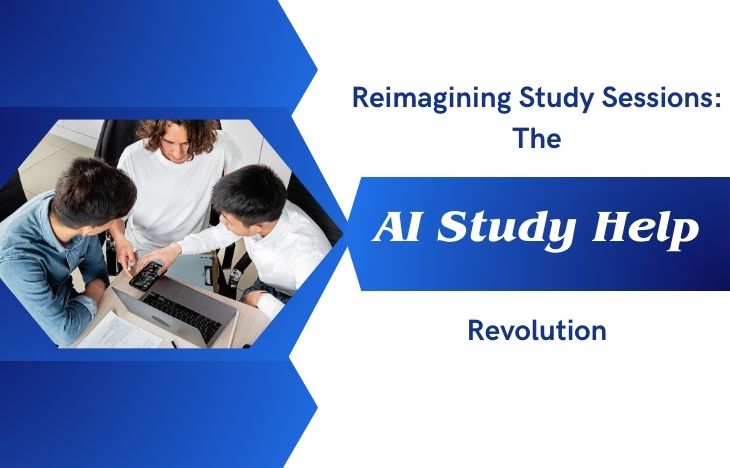Reimagining Study Sessions: The AI Study Help Revolution

Imagine a study session where distractions fade away, confusion turns to clarity, and learning becomes an exhilarating adventure. Welcome to the age of AI Study Help—a transformative technology that is reshaping how students engage with their studies. As artificial intelligence continues to evolve, its presence in education grows more profound and impactful. Gone are the days of passive memorization; today’s learners have access to personalized support right at their fingertips.
With tools designed to adapt to individual needs, students can now unlock new levels of understanding and retention. This isn’t just about cramming for exams; it’s about fostering a deeper connection with knowledge itself. Join us as we dive into this exciting revolution in education and explore how AI is changing the study game forever.
The rise of AI technology and its application in education
The rise of AI technology has ushered in a new era for education. From early learning tools to advanced tutoring systems, artificial intelligence is becoming an integral part of the classroom experience.
AI applications analyze vast amounts of data to tailor educational experiences. They identify students’ strengths and weaknesses, offering personalized resources that cater specifically to individual needs.
Gone are one-size-fits-all approaches. With platforms powered by AI, learners receive real-time feedback—an essential component for mastering complex subjects.
In addition, educators benefit from AI’s analytical capabilities as well. Teachers can track progress more efficiently and adapt their strategies accordingly. This synergy between technology and instruction enhances overall effectiveness in teaching methods.
As we embrace this digital age, it’s clear that AI’s role in education will only continue to expand, paving the way for innovative learning solutions that were previously unimaginable.
How AI study help is revolutionizing the way students learn
The integration of AI study help is reshaping the educational landscape. With personalized learning experiences, students can engage with material tailored to their unique needs.
Imagine a classroom where each learner receives instant feedback on assignments. AI algorithms assess performance in real-time, allowing for immediate adjustments and targeted support.
These tools also encourage exploration beyond traditional boundaries. Students can delve deeper into subjects they find intriguing, guided by intelligent systems that recommend resources based on individual interests.
Moreover, collaborative platforms powered by AI enable peer-to-peer interaction. This fosters a community of learners who share insights and strategies while tackling complex topics together.
As technology advances, so does its ability to adapt to various learning styles—making education more inclusive than ever before. The shift from one-size-fits-all approaches to custom-fit solutions marks a significant milestone in modern learning methodologies.
Benefits of using AI study tools for students
AI study tools offer personalized learning experiences tailored to individual needs. They adapt to a student’s pace and style, ensuring that concepts are grasped thoroughly before moving forward.
Another significant advantage is the immediate feedback these tools provide. Students can assess their understanding in real-time, making it easier to identify areas needing improvement without waiting for traditional assessments.
Moreover, AI study help encourages engagement through interactive features. Gamified learning elements make studying enjoyable, transforming mundane tasks into exciting challenges.
Time management also sees a boost with AI assistance. Many platforms include scheduling aids that help students organize their study time effectively and prioritize tasks based on deadlines or difficulty levels.
Accessibility is enhanced. Students from various backgrounds can access quality resources anytime and anywhere, promoting equitable education opportunities in today’s digital landscape.
Case studies of successful implementation in schools/colleges
Many schools are already experiencing the transformative power of AI Study Help. A notable example is a high school in California that integrated an AI-driven tutoring system. This platform provided personalized learning paths for students struggling with mathematics. Teachers reported significant improvements in student engagement and performance.
Another compelling case comes from a university in New York. They adopted an AI-powered study assistant to help students manage their assignments and deadlines more effectively. The result? Decreased anxiety levels during exam periods, as students felt more organized and prepared.
In both instances, educators noted that these tools did not replace traditional teaching methods but rather complemented them. By leveraging technology, institutions can enhance the overall educational experience while ensuring that individual learning needs are met efficiently.
Addressing concerns about reliance on technology for learning
Concerns about reliance on technology in learning are valid. Many educators fear that students may become overly dependent on AI study help tools, stifling their critical thinking skills.
However, it’s essential to recognize that these tools are designed to complement traditional education. They provide resources and support rather than replace the learning process entirely.
By using AI study help at SolutionInn, students can access tailored guidance for complex subjects. This encourages a deeper understanding of material while still promoting independent thought.
Moreover, teaching students how to integrate technology effectively into their studies is crucial. By fostering digital literacy early on, we prepare them not only for academic success but also for the demands of a tech-driven world.
It’s about balance—leveraging technology’s strengths while nurturing essential cognitive skills through active engagement with content.
Future possibilities and potential impact on education system
The future of education is poised for transformation thanks to AI Study Help. Imagine personalized learning experiences tailored to each student’s pace and style. This level of customization can lead to deeper understanding and retention.
AI will not only assess students’ strengths but also identify areas needing improvement. Adaptive learning platforms could evolve into essential tools in every classroom, making one-size-fits-all approaches obsolete.
Collaboration between educators and AI could redefine curriculum development as well. Teachers might use data-driven insights to create more engaging content, addressing gaps that traditional methods often overlook.
Moreover, accessibility could see a significant boost. Students from various backgrounds would have equal access to quality resources regardless of their location or circumstances. This democratization can bridge educational divides.
As these technologies develop, we may witness an education ecosystem rich with innovation, where learners thrive in their unique journeys.
Conclusion: Embracing the AI study help revolution for better learning outcomes
As we navigate the evolving landscape of education, embracing the AI study help revolution can significantly enhance learning outcomes for students. With its ability to tailor resources to individual needs, provide real-time feedback, and foster a more engaging learning environment, AI is not just an add-on but a crucial component of modern education.
The integration of AI study tools at platforms like SolutionInn demonstrates how technology can create personalized educational experiences that cater to diverse learning styles. The success stories from various institutions highlight the transformative power these tools hold in improving student performance and engagement.
While concerns about over-reliance on technology are valid, striking a balance between traditional methods and innovative solutions can lead to enriched educational experiences. As educators and students alike embrace this technological advancement, they set the stage for a future where learning becomes more accessible and effective.
The potential impact of AI in education extends beyond mere academic achievement; it cultivates critical thinking skills and prepares students for an increasingly digital world. By leveraging AI study help effectively, learners are empowered not only academically but also as lifelong learners ready to tackle future challenges with confidence.



